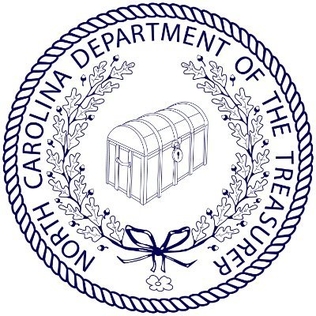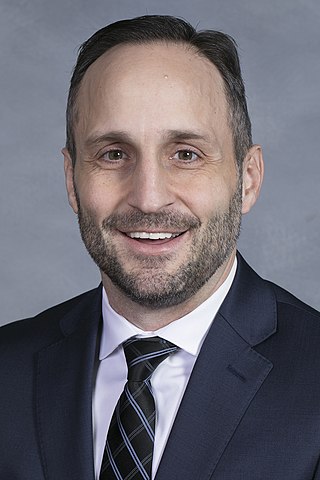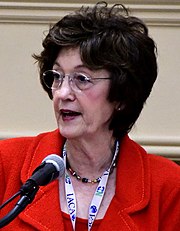
The governor of North Carolina is the head of government of the U.S. state of North Carolina. Seventy-five people have held the office since its inception in 1776. The governor serves a term of four years and chairs the collective body of the state's elected executive officials, the Council of State. The governor's powers and responsibilities are prescribed by the state constitution and by law. They serve as the North Carolina's chief executive and are tasked by the constitution with faithfully carrying out the laws of the state. They are ex officio commander in chief of the North Carolina National Guard and director of the state budget. The office has extensive powers of appointment of executive branch officials, some judges, and members of boards and commissions. Governors are also empowered to grant pardons and veto legislation.

The North Carolina General Assembly is the bicameral legislature of the State government of North Carolina. The legislature consists of two chambers: the Senate and the House of Representatives. The General Assembly meets in the North Carolina Legislative Building in Raleigh, North Carolina, United States.

The North Carolina Council of State is the collective body of ten elective executive offices in the state government of North Carolina, all of which are established by the state constitution. The Council of State includes the Governor, Lieutenant Governor, Secretary of State, State Auditor, Treasurer, Superintendent of Public Instruction, Attorney General, Commissioner of Agriculture, Commissioner of Labor, and Commissioner of Insurance. Together with the North Carolina Cabinet and several independent agencies, the Council of State offices constitute the executive branch of North Carolina's state government.

The lieutenant governor of North Carolina is the second-highest elected official in the U.S. state of North Carolina and is the only elected official to have powers in both the legislative and executive branches of state government. A member of the North Carolina Council of State, the lieutenant governor serves a four-year term with a two consecutive term limit. The current lieutenant governor is Mark Robinson, a Republican, who has held the office since 2021. The Constitution of North Carolina designates the lieutenant governor the ex officio president of the State Senate and a member of the State Board of Education. They are also required to serve as acting governor of the state in the event of the governor's absence, and assume the governorship in the event it becomes vacant.
The State Auditor of North Carolina is a statewide elected office in the U.S. state of North Carolina. The state auditor is a constitutional officer responsible for overseeing and reviewing the financial accounts of all state government agencies. The auditor also conducts performance audits of state agencies, ensures state agencies' accounting conforms with Generally Accepted Accounting Principles, evaluates the integrity of computer-generated information, and investigates the misuse of state funds or property. The incumbent is Beth Wood, who became state auditor on January 10, 2009.

The North Carolina State Treasurer is a statewide elected office in the U.S. state of North Carolina responsible for overseeing the financial operations of state government. The current state treasurer is Dale Folwell.

The North Carolina Superintendent of Public Instruction is an elected constitutional officer in the executive branch of the government of the U.S. state of North Carolina. As the head of the North Carolina Department of Public Instruction, the superintendent oversees the public school systems of the state. They also serve as the secretary of the North Carolina State Board of Education and are a member of the North Carolina Council of State. The incumbent is Catherine Truitt, who became superintendent on January 2, 2021.

The North Carolina State Board of Education, established by Article 9 of the Constitution of North Carolina, supervises and administers the public school systems of North Carolina. The board sets policy and general procedures for public school systems across the state, including teacher pay and qualifications, course content, testing requirements, and manages state education funds.

The Supreme Court of the State of North Carolina is the state of North Carolina's highest appellate court. Until the creation of the North Carolina Court of Appeals in the 1960s, it was the state's only appellate court. The Supreme Court consists of six associate justices and one chief justice, although the number of justices has varied. The primary function of the Supreme Court is to decide questions of law that have arisen in the lower courts and before state administrative agencies.

Rufus Lige Edmisten is an American attorney who served as North Carolina Secretary of State, Attorney General, and was the Democratic nominee for Governor in 1984. He is currently a lawyer in private practice.

The attorney general of North Carolina is a statewide elected office in the U.S. state of North Carolina. The attorney general is a constitutional officer responsible for representing state agencies in legal matters, supplying other state officials and prosecutors with legal advice, and leading the North Carolina Department of Justice. The incumbent attorney general, Josh Stein, assumed office on January 1, 2017. The position of attorney general dates back to North Carolina's colonial history. North Carolina's 1776 constitution established the office as an official appointed by the North Carolina General Assembly. The state's 1868 constitution made the attorney general an elected executive official with their duties prescribed by law. Since 1971, the officer has sat on the North Carolina Council of State.
The Constitution of the State of North Carolina governs the structure and function of the state government of North Carolina, one of the United States; it is the highest legal document for the state and subjugates North Carolina law.

The Commissioner of Agriculture is a statewide elected office in the U.S. state of North Carolina. The commissioner is a constitutional officer who serves as the head of the state's Department of Agriculture and Consumer Services, which is responsible for promoting agriculture in the state. They are also a member of the Council of State. The incumbent is Steve Troxler, who has served since 2005.

The Commissioner of Insurance is a statewide elected office in the U.S. state of North Carolina. The commissioner is a constitutional officer who leads the state's Department of Insurance. The commissioner also oversees the Office of the State Fire Marshal and sits on the North Carolina Council of State. The current commissioner is Mike Causey, who has held that office since January 1, 2017.

The Commissioner of Labor is a statewide elected office in the U.S. state of North Carolina. The commissioner is a constitutional officer who leads the state's Department of Labor. North Carolina's general statues provide the commissioner with wide-ranging regulatory and enforcement powers to tend to the welfare of the state's workforce. They also sit on the North Carolina Council of State. The incumbent is Josh Dobson, who has served since January 2021.
The Superior Court is North Carolina's general jurisdiction trial court. It was established in 1777 and is North Carolina's oldest court.

The 1984 North Carolina gubernatorial election was held on November 6, 1984. Democratic incumbent Jim Hunt was unable to run for another consecutive term under the North Carolina Constitution. Hunt ran instead for the U.S. Senate against Jesse Helms and lost, although he later announced his campaign for a third gubernatorial term in the 1992 election. Popular 9th District Congressman James G. Martin ran as the Republican nominee against Democratic Attorney General Rufus L. Edmisten, who defeated Hunt's Lt. Governor, James Green, among other candidates, in a hotly contested primary.

The government of North Carolina is divided into three branches: executive, legislative, and judicial. These consist of the Council of State, the bicameral legislature, and the state court system. The Constitution of North Carolina delineates the structure and function of the state government.

The North Carolina Constitutional Convention of 1835 was a meeting of delegates elected by eligible voters in counties in the United States state of North Carolina to amend the Constitution of North Carolina written in 1776 by the Fifth North Carolina Provincial Congress. They met in Raleigh, North Carolina from June 4, 1835, to July 11, 1835, and approved several amendments to the constitution that were voted on and approved by the voters of North Carolina on November 9, 1835. These amendments improved the representation of the more populous counties in the Piedmont and western regions of the state and, for the first time, provided for the election of the governor by popular vote rather than election by the members of the General Assembly.
The North Carolina Department of Revenue was created in 1921 by the North Carolina General Assembly. The department is headed by a Secretary that is appointed by the Governor. The secretary is a member of the North Carolina Cabinet. Currently, the department is responsible for administering the collection of the North Carolina state income tax, gasoline tax, sales tax, beverage tax, and inheritance tax.




























